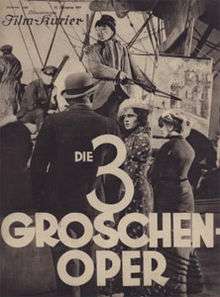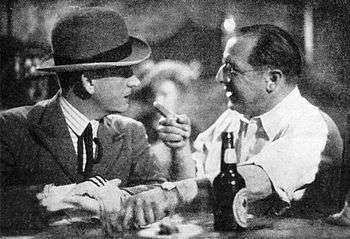The Threepenny Opera (1931 film)
| The Threepenny Opera | |
|---|---|
 | |
| Directed by | G. W. Pabst |
| Produced by | Seymour Nebenzal |
| Written by |
Béla Balázs Leo Lania Ladislaus Vajda |
| Starring |
Rudolf Forster Margo Lion Carola Neher Lotte Lenya Reinhold Schünzel |
| Music by | Kurt Weill |
| Cinematography | Fritz Arno Wagner |
| Edited by | Hans Oser (German version), Henri Rust (French version) |
| Distributed by |
Nero-Film Tobis Filmkunst Warner Bros. Berlin |
Release dates |
|
Running time | 113 minutes (German version) / 107 minutes (French version) |
| Country | Germany |
| Language | German- and French-language versions |
The Threepenny Opera (German: Die 3 Groschen-Oper) is a 1931 German musical film directed by G. W. Pabst. It was produced by Seymour Nebenzal's Nero-Film for Tonbild-Syndikat AG (Tobis), Berlin and Warner Bros. Pictures GmbH, Berlin. The film is loosely based on the 1928 musical theatre success The Threepenny Opera by Bertolt Brecht and Kurt Weill. As was usual in the early sound film era, Pabst also directed a French language version of the film, L'Opéra de quat'sous, with some variation of plot details (the French title literally translates as "the four penny opera"). A planned English version was not made. The two existing versions were released by The Criterion Collection on home video.
The Threepenny Opera differs in significant respects from the play and the internal timeline is somewhat vague. The whole of society is presented as corrupt in one form or another. Only some of the songs from the play are used, in a different order.
Plot

In late-Victorian London, Mackie Messer ("Mack the Knife") is a gang boss whose lover is Jenny, a whore in a brothel on Turnmill Street (Turnbridge in the film). On first seeing Polly Peachum, however, he persuades her to marry him. His gang steals the props needed for the wedding, which is attended by Tiger Brown, Mackie's old comrade-in-arms in India who is now Chief of Police and about to oversee a procession through the city by the queen.
Polly's father controls the city's beggars and is furious at losing his daughter to a rival criminal. Visiting Brown, he denounces Mackie as a murderer and threatens to disrupt the queen's procession with a protest march of beggars if Mackie is not caught. Tipped off by Brown to lie low, Mackie goes to the brothel, where the jealous Jenny betrays his presence to the police. After a dramatic rooftop escape, he is arrested and imprisoned.
Meanwhile, Polly buys a bank and runs it with Mackie's henchmen, making him a bank director. This causes a change of heart in her parents. Her father tries to stop the protest march but fails, and the procession turns into a battle between beggars and police. Jenny visits the prison and, by promising her favours to the jailer, allows Mackie to escape. He makes his way to the bank, where he discovers his new status. Peachum and Brown, whose careers are both ruined by the demonstration, also come to the bank and agree to join forces. Banking is a safer and more profitable form of crime.
Cast
- German-language version
- Rudolf Forster as Mackie Messer
- Carola Neher as Polly
- Reinhold Schünzel as Tiger Brown
- Fritz Rasp as Peachum
- Valeska Gert as Mrs Peachum
- Lotte Lenya as Jenny
- Hermann Thimig as parson
- Ernst Busch as ballad singer
- Vladimir Sokoloff as Smith, jailer
- Paul Kemp and Gustav Püttjer as two of the members of Mackie Messer's gang
- French-language version
- Florelle as Polly Peachum
- Albert Préjean as Mackie
- Gaston Modot as Peachum
- Margo Lion as Jenny
- Vladimir Sokoloff as Smith, jailer
- Lucy de Matha as Mrs Peachum
- Jacques Henley as Tiger Brown
- Hermann Thimig as parson
- Antonin Artaud as beggar
- Roger Gaillard as beggar
- Marie-Antoinette Buzet as whore at Turnbridge
External links
| Wikimedia Commons has media related to The Threepenny Opera (1931 film). |
- Die Dreigroschenoper at the American Film Institute Catalog
- The Threepenny Opera at Rotten Tomatoes
- Criterion Collection essay on The Threepenny Opera by Tony Rayns
- The Threepenny Opera at the Internet Movie Database
- The Threepenny Opera at AllMovie